Phone:
(701)814-6992
Physical address:
6296 Donnelly Plaza
Ratkeville, Bahamas.
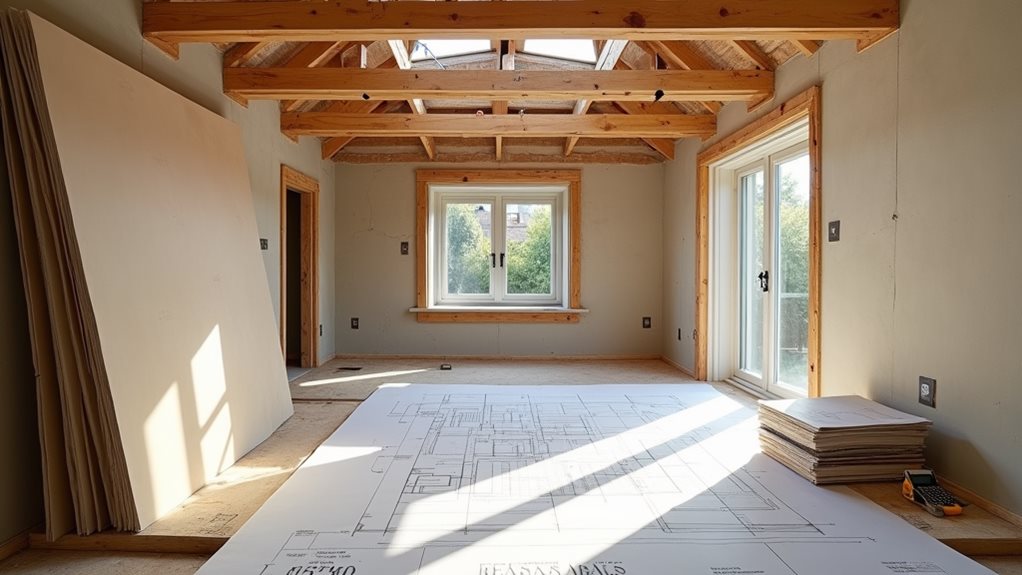
Building a bedroom extension in 2025 typically costs $170,000-$300,000, but what hidden factors could drastically affect your budget?
You’ll typically spend between £130,000 to £230,000 for a bedroom extension in the UK in 2025, with costs ranging from £1,500 to £3,000 per square metre. Metropolitan areas like London and Manchester command 25-35% higher prices than rural locations, while material choices can impact costs by £400 to £1,200 per square metre. Remember to factor in a 10% contingency and 5% inflation buffer. Your final investment depends on size, location, and design complexity – factors worth exploring for smarter budgeting decisions.
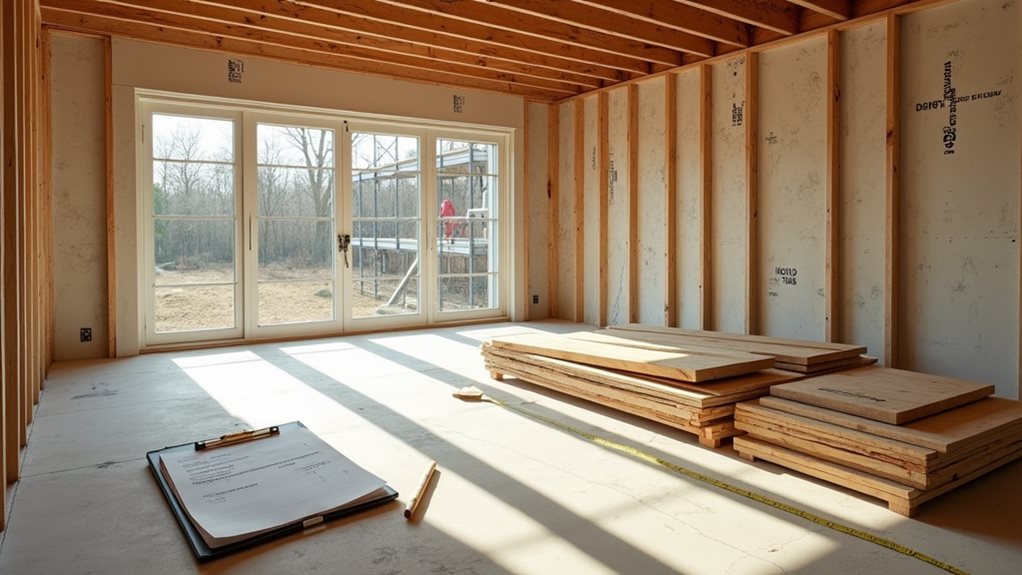
When planning a bedroom extension, understanding current market rates can help you budget effectively and avoid costly surprises.
You’ll find that standard bedroom extensions in the UK typically cost between £1,500 and £3,000 per square metre, with variations depending on your location and bedroom design choices.
For a well-appointed bedroom addition in the UK, you’re looking at around £130,000 to £230,000 for the total project.
High-end Extension: £2,500 – £3,000 per square metreA minimum project duration of six months should be factored into your planning timeline.
Basic Extension: £1,500 – £2,000 per square metre
Mid-range Extension: £2,000 – £2,500 per square metre
If you’re in a metropolitan area, expect to pay 25-35% more than rural locations.
Extension financing options should factor in a 10% contingency for unexpected issues and 5% for potential inflation.
You’ll want to evaluate whether you’re aiming for standard quality (£1,800-£2,100/m²) or excellent quality (£2,400-£2,800/m²) finishes, as this notably impacts your final costs.
The cost of your bedroom extension will largely depend on three vital factors: the size and layout complexity of your project, the quality of materials you select, and the labor rates in your area. Additionally, hiring local builders with expertise in overcoming unique challenges specific to the North West can also influence your budget. You’ll find that larger, more intricate layouts with high-end finishes can push your budget markedly higher, while simpler designs using standard materials help keep costs manageable. Your location plays a vital role too, as labour rates and planning permission fees vary considerably between regions, potentially causing a variance of thousands of pounds in your final project cost. For an average project, expect to budget between £15,000 to £38,000 for a standard bedroom addition.
Planning your bedroom extension’s size and layout complexity will greatly impact your overall budget, with costs ranging from £1,500 to £3,000 per square metre for basic single-storey additions.
Your design efficiency choices, from a cozy 9-square-metre space to a luxurious 37-square-metre suite, will determine your investment level.
For ideal layout enhancement, you’ll need to take into account whether you’re opting for a single or two-storey extension.
While ground-floor additions typically cost £2,700-£3,600 per square metre, second-floor extensions are more economical at £1,600-£1,800 per square metre.
If you’re including features like an attached bathroom, you’ll need to factor in an additional £1,200-£3,200.
Selecting materials for your bedroom extension represents one of the most notable cost variables in your project, with potential price swings of £50-150 per square foot based on quality choices.
Your material selections will impact both aesthetic appeal and material durability, affecting your home’s long-term value.
High-end options like hardwood flooring and custom-built fixtures create luxurious spaces but can notably increase your budget.
If you’re looking for a balance, consider mid-range materials such as laminate flooring and standard finishes, which offer good durability at reasonable prices.
For those working with tighter budgets, vinyl flooring and basic fixtures can still achieve attractive results while keeping costs down.
Don’t forget to factor in specialized materials if you’re planning features like soundproofing or smart home integration – they’ll add to your initial investment.
Beyond material choices, your project’s location and labor rates greatly shape your bedroom extension budget.
You’ll find notable location advantages in rural areas where overall costs tend to be lower, though you’ll need to factor in higher transportation expenses for materials. In urban settings, you’re looking at premium rates due to increased demand and market competition.
When it comes to labor costs, which typically account for 30-50% of your total budget, you’ll want to focus on smart labor negotiation strategies.
Current contractor rates in the UK range from £40 to £120 per hour, and they’ve increased by approximately 4.5% nationally over the past year. You’ll benefit from researching local market conditions and getting multiple quotes, as rates can vary considerably between regions and based on project complexity.
The breakdown of material and labor expenses forms the backbone of any bedroom extension budget, typically accounting for about 70-80% of your total costs.
You’ll find that material quality greatly impacts your spending, while smart labor negotiation can help manage costs effectively.
Your biggest expenses will likely come from external walls, roofing, and kitchen installations if included.
Remember that these figures represent average costs, and you’ll need to factor in your specific requirements and local market conditions.
Most homeowners find that investing in quality materials upfront helps avoid costly repairs later.
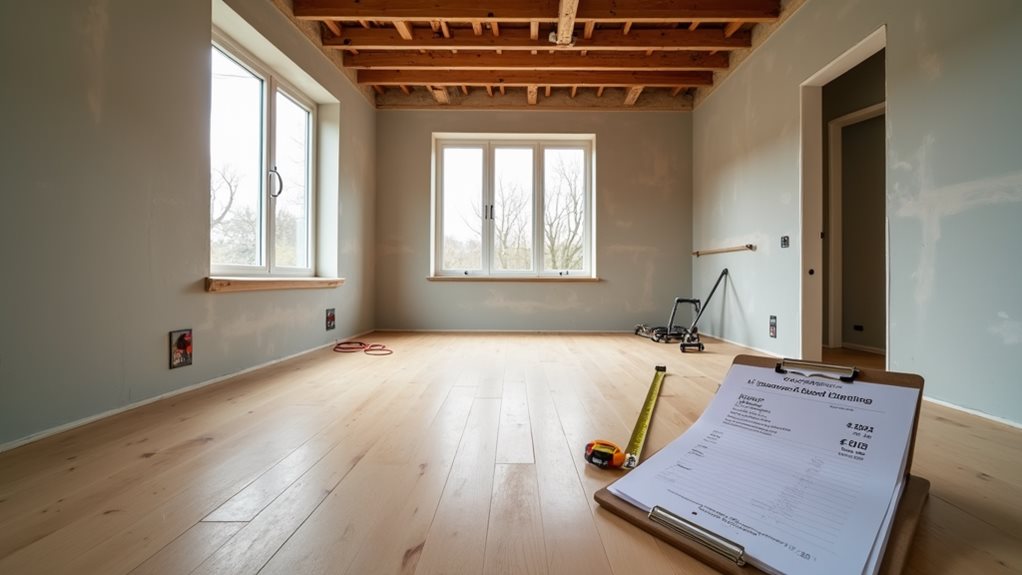
Understanding size considerations and cost per square foot stands as one of the most essential factors in planning your bedroom extension.
When you’re mapping out your project, you’ll find that bedroom dimensions greatly impact your cost projections, with typical sizes ranging from 100 to 400 square feet.
You can expect to invest between £950 and £1,900 per square metre for your addition, depending on your location and chosen finishes.
For perspective, a modest 3x3m room will cost you £8,550 to £17,100, while a more spacious 6x6m addition ranges from £34,200 to £68,400.
If you’re planning a primary suite with premium features, you’ll want to budget accordingly, as larger spaces typically incorporate higher-quality materials and additional amenities that drive up the overall cost.
You’ll need to factor in planning permission and building regulation approval costs, which typically range from £200 to £1,000 depending on your local council and project scope.
While London and other major cities often command higher fees, averaging £500-£1,000 for bedroom extensions, rural locations generally charge less, with permits closer to £200-£500.
Most local authorities require inspections at key stages of construction, including foundation work, framing, and final completion, so you’ll want to build these timeline requirements into your project schedule. Additionally, you may need to consider Party Wall Agreements if your extension affects a shared wall with neighbours, which can cost between £700 and £1,000 per neighbour.
When planning a bedroom extension, the inspection timeline becomes a critical component of your project’s success.
You’ll need to allocate between two to four hours for the initial inspection duration, with larger homes requiring additional time. For every 500 square feet beyond 2,000 square feet, you should expect an extra 30 minutes of inspection time.
Your inspection checklist must cover critical legal requirements, including proper egress windows measuring 24 inches tall by 20 inches wide, and ensuring you’ve met the minimum 70 square feet of floor space.
You’ll also need to verify that you’ve included at least two electrical outlets and that your windows meet the 8% glass-to-floor-area ratio requirement.
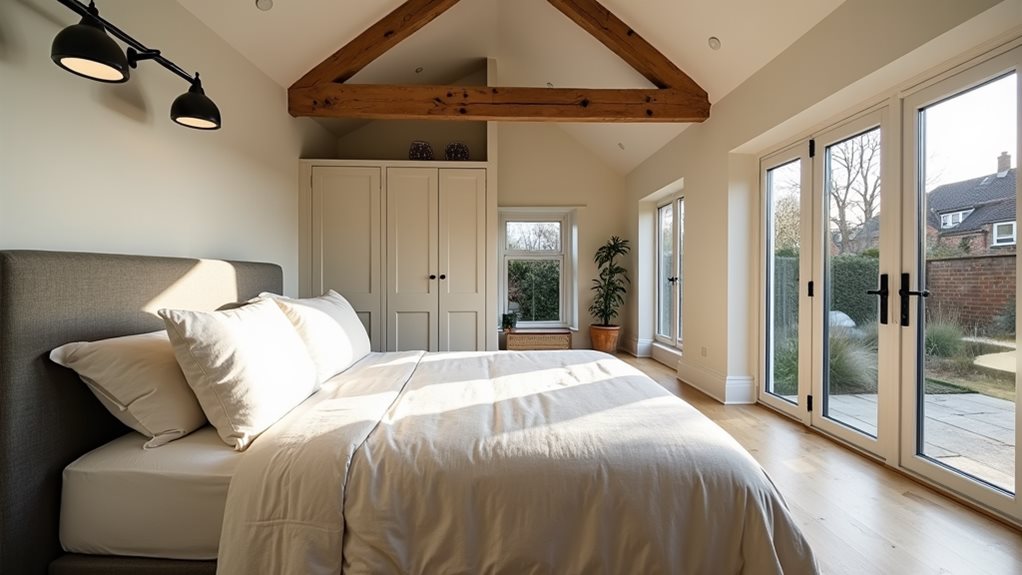
Several distinct design options exist for bedroom extensions, each with its own price implications and aesthetic benefits.
When you’re exploring current design trends, you’ll find that smart technology integration and energy efficiency features can increase your initial investment but offer long-term savings. Your choices in construction methods and finishes will greatly influence the final cost.
You’ll want to reflect on how each option aligns with your home’s architecture and your lifestyle needs while staying within your budget constraints.
Remember that statement features like unique roofing or bespoke fittings will add to your costs.
Making smart financial decisions throughout your bedroom extension project can lead to substantial savings without compromising quality.
You’ll find significant opportunities to reduce costs by selecting budget friendly materials and implementing efficient labor strategies. Consider scheduling your project during off-peak seasons when contractors often offer better rates, and don’t hesitate to negotiate terms.
To maximize your savings, focus on simpler designs that require fewer structural changes, and compare prices from multiple suppliers for materials.
You’re likely to find better deals when you research thoroughly and aren’t afraid to ask for competitive quotes. Remember to allocate 20% of your budget for unexpected expenses, and prioritize essential structural elements over cosmetic features.
When possible, opt for standard materials rather than luxury finishes, as they’ll often serve your needs just as well.
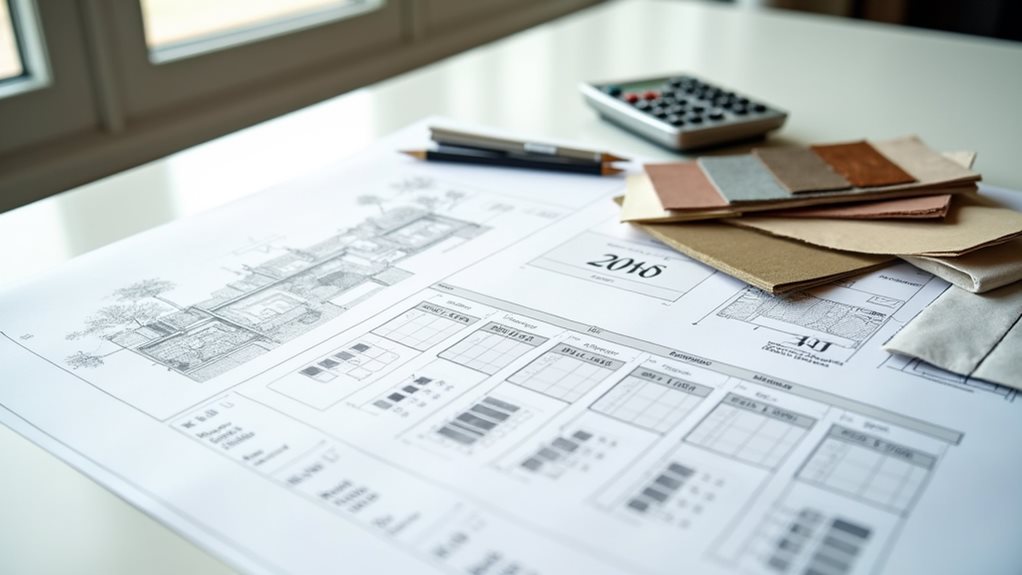
Successful bedroom extension projects depend heavily on meticulous timeline and budget planning from the outset.
You’ll want to establish a clear project timeline and budget allocation that accounts for both expected and unexpected costs.
Working with reputable builders, you’ll need to break down your budget into specific categories while maintaining a 20% contingency fund for peace of mind.
Planning your bedroom extension for 2025 is like charting a course through ever-shifting economic waters – you’ll need to stay flexible and informed. While today’s estimates suggest costs between £15,000 and £38,000, you’re wise to add a 10-15% buffer to account for market fluctuations. By carefully considering materials, timing your project strategically, and working with experienced professionals, you’ll create your dream space without breaking the bank.